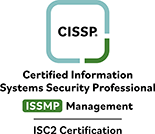Unable to find what you're searching for?
We're here to help you find itISSMP Course Overview
The CISSP-ISSMP (Information Systems Security Management Professional) course is an advanced certification for experienced information security professionals, specifically focusing on the management aspects of information security. It is designed to provide learners with the skills and knowledge needed to lead, design, and oversee an organization's information security program.
The course covers a wide range of topics, including leadership and business management, emphasizing the integration of information security into the company's culture and governance. Lessons on information security strategies, data classification, and security policy framework prepare learners to address complex security challenges within their organizations.
Through systems lifecycle management, the training ensures that participants understand how to incorporate security into the System Development Lifecycle (SDLC) and manage the associated risks. The course also delves into compliance and contingency management, teaching how to develop effective contingency plans and understand the legal and ethical implications of information security.
By completing CISSP-ISSMP training, learners will be equipped with the tools to develop robust security policies, manage risk effectively, and ensure their organizations are compliant with relevant laws and regulations, making them valuable assets in the field of information security management.

Purchase This Course
| Day | Time |
|---|---|
|
to
|
to |
♱ Excluding VAT/GST
Classroom Training price is on request
♱ Excluding VAT/GST
Classroom Training price is on request
Certainly! Below are the minimum required prerequisites for successfully undertaking the ISSMP (Information Systems Security Management Professional) course, which focuses on Leadership and Business Management in the context of information security:
Understanding of Information Security Fundamentals: A solid grasp of core information security concepts is essential. This includes knowledge of common security threats, vulnerabilities, and controls.
Experience in IT or Cybersecurity: It is recommended to have prior work experience in IT, particularly in roles related to cybersecurity or information systems management, to contextualize the course material effectively.
Familiarity with Organizational Governance: Basic awareness of how organizations are governed and the role of policies and procedures in maintaining security within an organization.
Knowledge of Risk Management: An understanding of risk management principles and practices, including how to assess and mitigate risks.
Awareness of Systems Lifecycle Processes: Recognition of systems development lifecycle stages and how security integrates into each phase.
Business Continuity and Disaster Recovery: An introductory level of knowledge regarding business continuity planning (BCP) and disaster recovery planning (DRP), including the development of contingency plans.
Legal and Ethical Considerations: Awareness of the legal and ethical issues surrounding information security, including an understanding of relevant laws and regulations.
These prerequisites are intended to ensure that participants are able to fully engage with the course material and maximize the learning outcomes. They are not meant to be barriers, but rather to set a foundation for a successful learning experience in the ISSMP course.
The ISSMP course focuses on advanced expertise in security management, emphasizing leadership and business acumen.
Target Audience for ISSMP Course:
The ISSMP course equips participants with advanced knowledge in information security management, focusing on leadership and business acumen within IT security.

